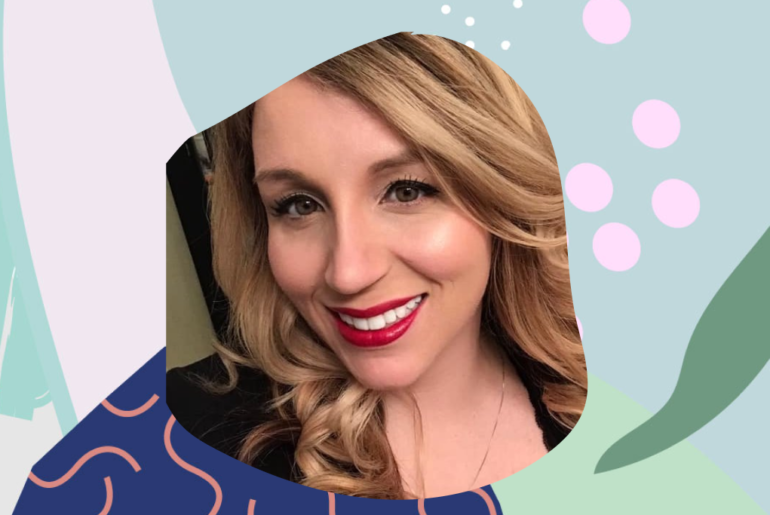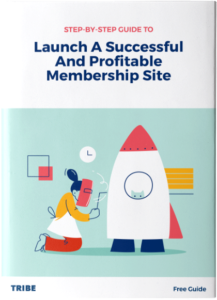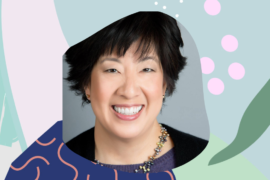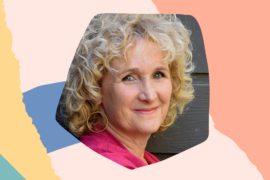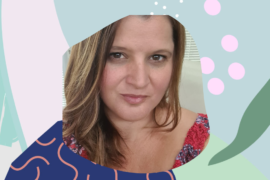After Lindsay Mustain’s father was laid off from his job after 25 years, his family lost everything. His suffering and his experiences being told time and time again that he was overqualified led Lindsay to a career in recruiting to help people. Her gift for connection, finding talent, and highlighting it led her to work for 25 Fortune 100 companies and ultimately to becoming Amazon’s most visible employee on LinkedIn.
When her time at Amazon had run its course, Lindsay walked away to pursue the membership model. Now, at Dream Job Hack, Lindsay uses her experiences from the world of recruiting and hiring to help people find careers where they love what they do. She uses her insider knowledge of just how broken the job search process is to empower her members to find great roles and earn more.
Today, Lindsay joins the podcast to share how she found her strength, how embracing the membership model has allowed her to do what she loves best, and why every aspiring entrepreneur already has all the tools they need hiding inside of them.
Key Takeaways
- How Lindsay’s father’s struggles in the job market after a layoff shaped her life’s work and career.
- What Lindsay learned from managing large recruiting processes – and from having to tell people “no” 99.9% of the time.
- Why Lindsay doesn’t want people to have to work with her more than once – and how the membership model allows her recurring revenue without interfering with this.
- How embracing the membership model gives entrepreneurs a deeper connection with each other.
Free Give
FREE Guide – Launch & Grow a Profitable Membership Site
Ready to reclaim your time and attract more monthly paying customers? Our step-by-step guide will show you how to build a membership site that turns your passion into recurring profit. Click here to download!
Memorable Quote
- “Everything you’ve ever wanted is on the other side of fear.” – George Adair
- “You must do the thing you think you cannot do.” – Eleanor Roosevelt
Episode Resources
Transcript
Read The Transcript
[INTRODUCTION]
Shelli Varela: On the heels of some of life’s most devastating tragedies, sometimes what we find is the support and community that carries us through.
Stu McLaren: There is a big trend brewing that’s revolutionizing the way business is being done. Big companies like Netflix, Amazon, and Apple are jumping on this too but so are thousands of others in all kinds of markets like photography and calligraphy, fitness, finance, meal planning, lesson planning, dog training, and so many more, and they’re doing it by shifting to a recurring revenue model. Hi. My name is Stu McLaren and for more than a decade, I’ve been helping tens of thousands of entrepreneurs generate recurring revenue through membership sites. Join our host, Shelli Varela, as she takes you behind-the-scenes to see how these companies are building a thriving tribe that spends with them every single month. Now, let’s get to today’s episode.
[INTERVIEW]
Shelli Varela: Lindsay Mustain, welcome to the It’s A Tribe Podcast. Buddy, how are you?
Lindsay Mustain: Oh, I’m fantastic. Thank you so much for having me.
Shelli Varela: I’m excited to share your story. It resonates with me personally for a number of reasons. I am both an entrepreneur and an employee and I love the change and the hope and the possibility that you’re creating for people in terms of job searching and landing their dream job. But before we get into that and how you became a membership site owner, we would love it if you would share your story before you were the Lindsay Mustain that we’re talking to today.
Lindsay Mustain: Well, I came from some pretty humble beginnings, and my story kind of goes all the way back to my childhood. So, we’re going to start like at the beginning. And when I was a little girl, I had a pretty normal life like when I was really little, I had a pretty normal life. And then my dad got laid off from his job. He’d been there for 25 years. He wore a gold watch to work every day when they used to reward those kinds of tenure. And then one day it was just over and we started hearing this word in my house that I never knew. I mean, when you’re young, you’re not supposed to know what these are but it was overqualified, overqualified, overqualified. And basically, my family lost everything. We lost our home, my family split up, and then my dad got really sick, and he walked into an emergency room. And they took him back for emergency brain surgery because they found a tumor in the left lobe of his brain but when they looked in there, they said there was no hope and he passed away just a few months later. He spent years job searching and his life ended thinking that he wasn’t worthwhile. Somebody didn’t believe in him because of the story that one employer told him about his worth. And it’s those stories today that kind of propelled me to do what I do professionally.
Shelli Varela: Wow. That’s powerful. So, when you were a little girl, did you know? Was there something that was ignited in you as you watch that? Because I know that oftentimes what we go on to do in the world, there is a spark or a kernel or a route that if you trace it all the way back is one of those things. When we were younger, we noticed something, we learn something, we realized something. Was this one of those moments for you that led you to become a recruiter?
Lindsay Mustain: Yeah. So, it’s really interesting because the one thing I always used to say after this was that I just want to help people. And I think that’s really true, the people that I serve. They just want to help people. They’re here to make the world a little bit better by the end of their life. And that’s one thing that I realized was life was really finite, and that I only had a limited time and so that in my life, I was not going to be passive that I was going to go out and seek the things that I wanted. And it made me different. It made me different in a lot of ways. I think a lot of job seekers that I work with or even entrepreneurs that I work with, they already knew that they were different from the crowd, but what I really knew was that I wanted to help people. So, the first job I ever had, I started as a manager in training, and the recruiter said, “Where do you see yourself in five years?” then I said, “I’d really like to do what you do.”
And that was the door that opened everything for me. When I got into that role, it was like I found what my strength was, which was connecting to people, finding their talents, presenting them in the most spotlighted and highlighted way of their achievements and their accomplishments, and getting people sold on what they had to offer even if they didn’t seem like they brought everything perfectly to the table. So, that was what my career began as a recruiter and I spent 18 years doing it. So, I worked for really large companies here and I’ve worked with actually 25 of the Fortune 100 companies and staffing strategies because of my work. And most recently, I worked at Amazon where I became their most visible employee. They gave me a job that had never existed after that, which was to become like a professional matchmaker as a recruiter.
Shelli Varela: Wow.
Lindsay Mustain: Yeah. So, I was hiring people all over the world just because I got really loud and I got really loud about one thing, which was how broken the job search process was. I knew it was because I was the one on the other side of the table. I had built it. In fact, I had built the systems that they had to beat and I realized we were stacking the odds against them. And when I did the research, I realized how serious it was and I realized I couldn’t let that story happen again like my dad’s. I couldn’t let that because he was qualified and he was smart. I mean, he was the smartest man I ever knew. And there was no reason that story needed to repeat itself because I think of all those little families out there with people like me, that they need that help and that guidance, especially today. And so, that’s why I got really, really loud about it. That’s how I got such visibility. And so, they gave me this role, which allowed me to reach out and impact a lot of people.
Shelli Varela: I’m curious with something that you said and I’m wondering how this affected you personally. You were saying that you knew how broken it was and we were stacking the odds against them because you built it and yet still, that innate talent that’s inside you was the gift of connection and seeing other people’s talent. Was there some sort of internal rub for you or something? And the reason I’m asking this is because oftentimes the listeners will echo back that there was that time when something just didn’t quite feel right. Would that be one of those times for you? And what did that feel like for you as you’re going through it?
Lindsay Mustain: I would be really honest in that I have reviewed over a million resumes. So, one of the work I did was I managed large, large recruiting processes. And so, when it comes down, I’ve hired 10,343 people out of a million. So, I only got to say that maybe 15,000 times I got to say yes. So, 99.9% of time I was telling people no, and it wasn’t because no, you’re not qualified, no, you’re not good enough. It was just you’re missing just this one little piece, this one thing if you had just presented it a little differently. And it’s something that you were barred from being able to tell employee or we were barred from being able to tell candidates about that because they weren’t allowed to know that because of our internal policy. So, if you’re trying to get feedback from an interview. So, what I would do which is I just saw the rules as like flexible. I actually went and I got my higher certifications in HR, I got the highest or I got my degree in it, and I pursued it too so I could be at a level of excellence.
And so, I do where I could flex it. And so, one of the things I started doing is I said, “For your next interview, here’s something you should think about.” And so, I walked away with the idea that I could help people even if it wasn’t this yes and I always said, it’s not a no right now. It’s just a no or not a no forever. It’s just a no today. So, I don’t want you to go anywhere and I don’t want you to think that this is about you. You have something that’s amazing to offer and here’s what you can do to help yourself move forward. And so, I got louder and louder about that. So, on LinkedIn, I became like the most visible employee of all of Amazon. There was like 250,000 of us at the time. So, yeah, it was pretty remarkable and I got really passionate because I heard the pain and the strife that they went through and it just took me that moment when I was watching my dad go through that and I look back on that time and I think if I could just know what I know now, I could have helped him.
And it’s that thing where I said I can’t do that. So, what I can do now is help all of those other job seekers right now that are today are feeling like they’re broken, like something’s wrong with them that they don’t think they’ll ever get out where they’re at because they’ve been told these stories and said no and rejected time and time and time again, that we can fix that for them.
Shelli Varela: Well, it seems interesting because you have this unique perspective where you can see their talent perhaps in ways that they can’t see themselves and that had to have such an emotional charge given that you watched your dad and you watched your dad’s story and the word you use was overqualified and how heartbreaking that must be when you pair it against these people that are coming to you, whose talent you see yet you can’t hire.
Lindsay Mustain: Yeah. It was really hard because you can see it like I see the flame. In fact, one of the things for my clients is that I still have that perspective. Like when somebody comes to me and they are beleaguered, they’re just exhausted from the job search process, they think there’s something wrong with me and that I will be lucky if I make it out of this. And so, they don’t try to go higher in their career. They try to survive. They try to just make it. Just get a job and they live for their weekends. They live for the weekends because the weekday, it’s like they’re selling their soul bit by bit for a paycheck. And that part where I see this huge potential, all these things that they bring to the table as a candidate, to as an employee, they’re the kind of employee that transforms an organization because they have this belief of what they do. And a lot of times they’ve been penalized for it for being different, for being not okay with the status quo, which is like there’s an innovation crisis in corporate America. These are the most important people inside of a company.
Shelli Varela: Absolutely, yes.
Lindsay Mustain: They’ve been branded some way that they’ve now taken, I call them their scars, like job search scars, job search trauma, but they carry these stories with them like as if that was the reality and I’m like, “No, your story is actually the one you get to choose to tell,” and it’s hard sometimes to release that because they think, “Oh, this is my story.” And I’m like, “No, it’s not your story. It’s just part of the path you got to at this point.”
Shelli Varela: Wow. That’s what happens though when you handcuff a change maker, right?
Lindsay Mustain: Exactly. It’s like putting a little balloon and poking a pinprick in it and letting it slowly deflate until the point where they left their job, which is what actually happened to me in Amazon.
[ANNOUNCEMENT]
Stu McLaren: So many people in all kinds of niche markets are leveraging their existing knowledge and influence and they’re transforming it into passive monthly income. This isn’t luck. This is a repeatable formula for producing a growing subscription income and if thousands of others can do it, you can too. To find out what type of membership site would be right for your business, visit GetTRIBEGuide.com. Go to GetTRIBEGuide.com and download it today. You’re awesome!
[INTERVIEW]
Shelli Varela: Yes. So, can you tell us more about that and how you went on to become a membership site owner and a course creator and how you’re now transforming and taking all of that accumulation of skills, knowledge, experience, and the ability to see other people’s talents and flipping a switch on what you were told was “the way to do it” which clearly wasn’t working and certainly wasn’t feeding your soul.
Lindsay Mustain: I am so happy to tell you about this because it’s like I found what I was meant to do. So, when I was at Amazon, I actually was in a room where Jeff Bezos asked us what is it that you could do to change the world. And I was like I was surrounded with some of the most brilliant people on the entire planet. I’m not sure that I have anything. So, I walked away. I was like it just started my wheels turning and then I had my like eureka moment because I had already become the most visible employee of Amazon so I knew I had a platform to actually speak from. And I realized that 100% of our candidates were our customers and that if we could say we were a customer-centric company, how can we not be candidate-centric? And I was just so distracted and so then I decided. And I had a glass office so I was writing on the walls in marker like it looked like something some from like a Rain Man moment.
And I was able to identify how we could build a process where they could actually use all their resources as they were today the existing and recruiters and make it so it was automated, which I’m really big fan of Kaizen so lean process, how we can become ambassadors instead of people who check the box and forward and a lot of it is administrative inside of recruiting and how we can start to find people and put them in a place in a company that thrives on innovation. And I went to my boss and I told her the story and she stopped me two minutes in and said, “You know what, I think we’ve got that covered.” And it was like all of the wind was sucked out of me, all of it. It was so painful like it just was crushing because I had literally like invested in this so much because I’m like, we’re having tens of thousands of applications every day and we have this process where we had to go and disposition everybody who ever been there. And it wasn’t just like a couple of thousand. It was millions of people who never even bothered to hear back from us.
And it was like we have a serious problem here. We have a really big issue and candidate experience became like this thing I was talking about. And so, I was like, “Wow. Okay. So, I’m barred, even though you gave me a job that never existed, barred from doing the thing that I actually want to do.” And so, it was a time where I just started to justify why I would stay there and solidified inside of my employees. They’re like, “Well, you know what, I have benefits, I have a good paycheck.” And even though I’m dying a little bit every day in my job, I’m thankful that I have a job and I get paid well, but it’s not enough. And then my breaking point came when I had a job opening and it was a gentleman that had three candidates that were actually qualified to do it, like in the world, inside of Singapore, and I got a message on LinkedIn and there’s two men and one woman and the woman came back to me and said, “I have never been treated so horribly,” and it broke my heart and it made me angry and first thing I did was escalate it to the recruiting leader for that continent.
And then I wrote my resignation notice, because, at this point, it was the straw that broke the camel’s back because I just knew that I could not do this anymore. And I didn’t know really what was next but I knew that this wasn’t it. And my husband was a stay-at-home dad. I walked away from all of my stock options. I walked away from everything and everybody security. And on my last day, I remember feeling so scared, but hopeful that what was on the other side was something that I could do that actually would change the world.
Shelli Varela: So, how did that lead you to being a membership site owner? How did that lead you to TRIBE?
Lindsay Mustain: Well, I created a program called Dream Job Hack and it’s for senior professionals in corporate America who feel like they’re slowly dying in their career selling their soul bit by bit for a paycheck to find their next career where they love what they do, where they finally get to make the most meaningful contribution that they’ve ever done. So, at the end of their life, they realized what they were able to accomplish in this one lifetime that actually made a difference. And so, I created this program called Dream Job Hack and it’s amazing. I mean, even in lockdown, we got somebody a six-figure raise, $100,000 more per year that’s every year and my average is somewhere between 38 and 41 over the last two years. And obviously, these numbers push it up a little bit, but my lifetime average is still five figures. And I know what I’m doing because I was the person they had to beat. So, I decided to outline everything that went to that process.
And after working with millions of job seekers, like I knew now that what had to happen in order for you to be successful, so I built an entire program. And then I have the strange philosophy, which maybe some people can understand where I wanted them to come in and I didn’t want them to ever work with me again. This sounds like an interesting business strategy, but my goal is like I want you to do this because I’m teaching you a way that you will never have to job search again, ever. But my clients came to me and they said, “How do we work more with you?” Give us something and tada. Thanks, Stu McLaren, for introducing the idea of TRIBE to me and how powerful a membership site could be, and that what I was doing is just helping people get what they really needed from me, which was more assurance, more corrective coaching. And we created this Dreamer Collective which has been, I’m going to say is probably the proudest thing I have.
I told my husband the other day, I said, “This is my favorite hour of the week I spent,” because guess what, I only spent five hours a month doing it but those five hours make me feel more alive and connected and understanding of my clients than any other moment.
Shelli Varela: You talked about the moment when you bought TRIBE was under some trying circumstances if you’re willing to share or not but what was the most pleasant surprise that you received from getting TRIBE that you weren’t expecting?
Lindsay Mustain: Well, if I can, I’m going to go back and tell a little bit of a story about what happened to that because it’s hard to understand because I was so excited. I used to because I coached under Russell Brunson. And so, I saw Stu all the time, and I just loved his energy and his heart for giving. And so, I knew that a bunch of the people who are inside of this group were actually part of TRIBE and I knew I wanted to do it. So, I was ready. I was waiting for that cart to open. And then sometimes life just doesn’t give us what we expect. And it was on my daughter’s fifth birthday. I got the call that my brother had been murdered. And it’s a very hard story to tell.
Shelli Varela: Of course.
Lindsay Mustain: So, my life kind of upended at that moment like I thought I was like I’m finally getting the hang of this like people are having incredible results. And I look at that person who I was a year ago and I’m like, “Who is she?” Because she doesn’t exist anymore. It changes everything for you. And I was not able to join at the time or I thought I wasn’t able to join because I just had too much other stuff going on.
And Rachel Peterson, who is a member of TRIBE and one of I think the best affiliates there, but she, I was talking to her about it and she’s like, “It’s okay. You don’t have to do this right now. I give you permission to go ahead and let this opportunity go by because you have a lot of stuff on your plate.” And then I came down and I was in the state where he was actually killed in his home. So, I had to deal with a police investigation in the home to taking care of the crime scene and everything and I was just like I was emotionally exhausted like the kind of thing you never like I’ve been through a lot of stuff in my life but this is the one that I say I’m like forged by fire now. I know that I don’t know how to quit because I’ve been through the hardest things and I still come back at it. So, I hope some people can resonate with that. But I sat there and I was in my hotel room and this countdown timer was coming down.
And I had asked the universe like give me a sign if I’m supposed to join TRIBE, and I was driving there, and I looked up and I saw this truck. It was huge letters that said, “TRIBE.” And I was like, “Well, there’s my sign,” and I still was like, “Oh, God, I don’t know.” And then I finally was like, “I’m going to just do it. I’m going to do it on the payment plans. I’m just going to do it.” And I’m going to tell you that that was probably one of the best decisions I ever made. So, we created the Dreamer Collective, which allowed me to connect with my customers, my ideal clients, the people who I lived my career for as a recruiter, and help them do it better and faster. We know that this is actually instead of like sometimes membership sites are meant to like the slow and grow like you go along and you learn little by little. Well, this actually becomes an accelerant for us. And so, by getting that coaching, by getting that feedback, they were no longer stuck instead of feeling like there’s something wrong with me, which is the story that we internalize when we can’t find a job then they went from it’s not about me. I just need to know what to say to the right person at the right moment that will open the doors for me.
And when that kind of coaching happens, especially as you go along, because you’re getting rejected. In fact, you’re going to get rejected 90% of the time when you apply to a job. 98% of the time is the stat. So, I don’t know about you, if you picked a 2% solution for a medical procedure, like it was a 2% chance of working, you should probably do it. Hundreds and hundreds of times over and over again and they wonder, “What’s wrong with me?” And I’m like, “It’s because you’re doing like the definition of insanity. You got to change things a little bit here.” So, we show them how to do that and now they get to go to work every day where they love what they do. They make their most meaningful contribution. When they come home, instead of feeling exhausted, they’re excited. They have the power and energy to go and invest in their family when they get home. They don’t just live for the weekend. Every day is like a gift because they go to work, do something that really matters, which is energizing and come home and able to make a bigger difference at home because that’s actually who matters is the people behind you to have that kind of life.
Shelli Varela: So powerful. I love all of this and it really almost is like unhandcuffing the changemakers and putting them in positions of power and holding up a mirror for their gifts. That’s incredible. If you had to look back on the woman who was thinking about leaving her corporate job, knowing what you know now, what would you tell that scared moment?
Lindsay Mustain: There is a quote in my background here and I think you probably can see it and it says, “Everything you want is on the other side of fear.” And this became my mantra when I left my business because I was scared because I didn’t tell this part but I actually ended up homeless and I know what it’s like to have nothing and that’s probably what kept me kind of handcuffed to my career was I was scared of what I would lose. Everything you want is on the other side of fear and also Eleanor Roosevelt said, “You must do the thing you cannot do,” and that the other side of this, we’re comfortable with what we are, right? We are always trying to probably grow and improve but we don’t ever push ourselves to the point where you think this is like the quantum leap and this was my quantum leap moment where I became successful immediately. And that’s always the story but I had built that audience already. And I was really lucky. I didn’t know what I was doing. It just happened to be that really loud.
And it allowed me to write a best-selling book, which surprised me because I gave it away for free. It allowed me to start a business. And so, I guess the biggest piece of advice, what I would say is that you have everything you need. I even have it actually, as a post-it note on my computer. It says you have everything you need. And I think that’s the truth and it’s true of almost every entrepreneur that I know.
Shelli Varela: It’s so true and what a gift you must be to the people who get to walk hand-in-hand. So, for those people that are experiencing that fear and are maybe armed with all of the gifts they need, they just need to present them in a different way or just that quarter-turn that you from your vantage point can see the ability to change somebody’s life, happiness, family. Amazing.
Lindsay Mustain: Absolutely.
Shelli Varela: Incredible. Thank you so much for sharing your story. Incredibly powerful. And thank you so much for being part of the TRIBE Community. If people are looking for you online, where’s the best place they can find you?
Lindsay Mustain: You can go to LindsayMustain.com.
Shelli Varela: Sounds great. Thank you so much, Lindsay. We appreciate you.
Lindsay Mustain: Thank you, Shelli.
[CLOSING]
Stu McLaren: I hope you love that story. It’s amazing, right? That’s what It’s a TRIBE Thing is all about. So, many people in all kinds of niche markets are leveraging their existing knowledge and influence and they’re transforming it into passive monthly income. Listen, this isn’t luck. There’s a repeatable formula for producing a growing subscription income and each week we’re going behind the scenes to show you exactly how they did it. Get the latest stories and actionable ideas from each episode at www.ItsaTRIBEThing.com and if you know one other person who could benefit from this, tell them to subscribe. Tell them to go to ItsaTRIBEThing.com.
[END]
To learn more and get access to all episodes, visit our podcast page!
